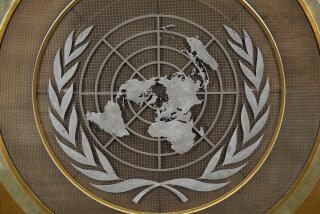Ex-Putin Aide Denies Charges of Oil Payoffs
- Share via
MOSCOW — A former chief of staff to President Vladimir V. Putin denied Wednesday that anyone in the Russian leader’s administration had received oil payoffs from Iraq in exchange for opposing United Nations sanctions or the U.S.-led war that toppled Saddam Hussein’s regime.
Alexander S. Voloshin, once considered the second-most-powerful man here, did not rule out that Russian businesspeople might have falsely led Iraq to believe that they were acting on behalf of the Kremlin. But he insisted that his country opposed the war as a matter of principle, not as the result of bribery.
“Russia thought the war was a mistake in principle and that there was no real proof that Iraq had weapons of mass destruction. And all the subsequent investigations proved us right,” Voloshin said in a briefing with a small group of foreign journalists.
In his meetings with President Bush and other top administration officials in Washington shortly before the war began in March 2003, Voloshin said, “I explained to the Americans that of course [Iraq] is a dictatorship, Saddam Hussein is a complete dictator, but this was no threat to the United States or anybody close. And when this dictatorship falls, chaos will envelop the country.”
When he arrived in Washington, Voloshin said, U.S. officials quizzed him repeatedly.
“They had an idea that we should bargain,” Voloshin said. “They were asking: ‘What are your interests in Iraq? What can you say?’ And despite all the talk, Russia didn’t have a lot of interests in Iraq.... There was no strong reason for Russia to support the regime of Saddam.”
Voloshin’s account was presented in response to a report last week by a U.S. Senate committee on the U.N. oil-for-food program, under which Hussein’s regime was allowed to sell oil despite international sanctions in order to provide food for the Iraqi people.
The report says the Russian presidential council, headed by Voloshin until October 2003, received illegal oil allocations worth more than $16 million under the program from 1999 to 2003. Voloshin and the council were said to have walked away with nearly $3 million in exchange for working to lift U.N. sanctions.
But the onetime senior Putin aide, often referred to as the “gray cardinal” of the Kremlin before he resigned in protest over the arrest of former Yukos Oil Co. chief Mikhail Khodorkovsky, said he was never the beneficiary of shipments under the program, never received money and never met with Iraqi officials.
“Neither the administration of the president, the presidential staff, nor myself personally ever had anything to do either directly or indirectly or through intermediaries in trading in Iraqi [oil] quotas,” he said.
Voloshin also said he had never met Sergei Isakov, reportedly identified by former senior Iraqi officials as Voloshin’s envoy in the alleged transactions.
“Isakov was considered my ‘friend’ and ‘confidant.’ But a character like this never worked on the presidential staff. He has never been my friend or emissary, if he really exists at all.... I do not know such a man.”
Though Senate investigators have said they have not tried to link illegal oil allocations directly to nations’ political policies on Iraq, Voloshin hinted that such a connection was implicit.
“It’s not a good position for the U.S.,” he said, “that those who do not agree with you are idiots and they have some kind of commercial interests.”
The Senate Permanent Subcommittee on Investigations also alleged in its report that additional payments had been traced to the Russian Foreign Ministry, the pro-Putin party United Russia and ultranationalist politician Vladimir V. Zhirinovsky.
In a response, the Foreign Ministry said Russian companies had participated in delivering humanitarian supplies and exporting Iraqi oil in compliance with U.N. regulations and Russian law.
“We are bewildered by the thrust of the report in which Russia is incriminated by the very fact of its participation in the Iraq humanitarian program,” the ministry said.
It said Russia would continue to cooperate in the work of an independent commission appointed by the U.N. that is investigating alleged abuses in the oil-for-food program, and has appointed a special working committee in Moscow to aid in the effort.
So far, the ministry said, the Kremlin had “not received from this commission any documented facts that would point to possible abuses by Russian companies or individuals.”
Zhirinovsky, who is deputy speaker of the lower house of parliament, declined to comment on the allegations. However, he told Russia’s Echo of Moscow radio that he had not received any payments from Iraq, an allegation the Senate report traces in part to former Iraqi Vice President Taha Yassin Ramadan.
“They [the U.S.] are keeping the vice president of Iraq. Let him show them the documents: Did they pay me a single cent, not to mention a dollar?” Zhirinovsky said. “I would gladly have taken it, but Iraq has no money.”
Senate investigators said they had six letters signed by Zhirinovsky that discuss the allocations and more than 30 documents from the Iraqi Oil Ministry that expressly identify Zhirinovsky and his Liberal Democratic Party in connection with the alleged oil sales.
Staff members said Zhirinovsky had funneled millions of dollars in kickbacks and a building worth $800,000 in downtown Moscow to members of the Iraqi regime in exchange for oil allocations.
More to Read
Sign up for Essential California
The most important California stories and recommendations in your inbox every morning.
You may occasionally receive promotional content from the Los Angeles Times.










